|
October 4, 2021 - No. 91
Workers Nationwide Fight New Assault on Health Care
Governments' Refusal to Protect
the People
- Barbara Biley -  
Actions in Alberta in August oppose Kenney government's reckless reopening measures.
• Alberta Government Adds Health Care Facilities to Its "Critical Infrastructure" Legislation
- Peggy Morton
• Manitoba Nurses Call for Action on Staff Shortages and Poor Working Conditions
• Ontario Hospital Workers Stand Firm in Defence of Their Rights
• New Brunswick Workers Demand Immediate Action to Address Staff Shortages in Seniors' Homes
Workers Nationwide Fight New Assault on Health Care
- Barbara Biley -
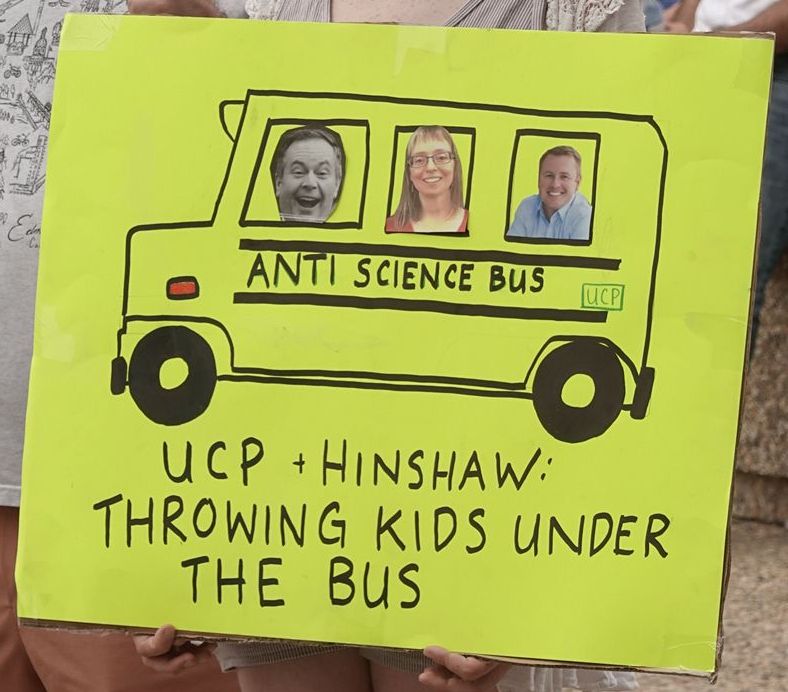 On September 29, Canadian Medical Association President Katharine Smart
issued a statement entitled "We need to mobilize now: Alberta and
Saskatchewan's health systems at breaking point." In it she calls for,
among other things, effective public health measures such as
'firebreakers' or 'circuit breakers' to aggressively
control COVID-19 cases, bringing health workers from other provinces to
assist, and transporting patients to other provinces that have ICU
capacity. She told the Globe and Mail in
a phone interview that "What we're seeing now is essentially no ability
to provide any other acute-care medicine beyond care to people with
COVID. So, in
essence, the health care system has already collapsed." In her
published statement she said, "We are now witnessing an unprecedented
health care crisis in Alberta and Saskatchewan -- and patients and
health workers are experiencing unfathomable choices and consequences.
Early relaxation of public health measures has left two crumbling
health
care systems in their wake and the dire realities are now in full view."
On September 29, Canadian Medical Association President Katharine Smart
issued a statement entitled "We need to mobilize now: Alberta and
Saskatchewan's health systems at breaking point." In it she calls for,
among other things, effective public health measures such as
'firebreakers' or 'circuit breakers' to aggressively
control COVID-19 cases, bringing health workers from other provinces to
assist, and transporting patients to other provinces that have ICU
capacity. She told the Globe and Mail in
a phone interview that "What we're seeing now is essentially no ability
to provide any other acute-care medicine beyond care to people with
COVID. So, in
essence, the health care system has already collapsed." In her
published statement she said, "We are now witnessing an unprecedented
health care crisis in Alberta and Saskatchewan -- and patients and
health workers are experiencing unfathomable choices and consequences.
Early relaxation of public health measures has left two crumbling
health
care systems in their wake and the dire realities are now in full view."
Alberta currently provides the worst example of social
irresponsibility in this regard, but other provinces are in fact no
better. The agenda of the ruling United Conservative Party (UCP) in
Alberta "to keep the economy open," no matter the consequences serves
the demands of the monopolies and is rejected by all those on the front
lines of the
healthcare system. The government has nonetheless already rejected all
calls to take strict public health measures to get the pandemic under
control.
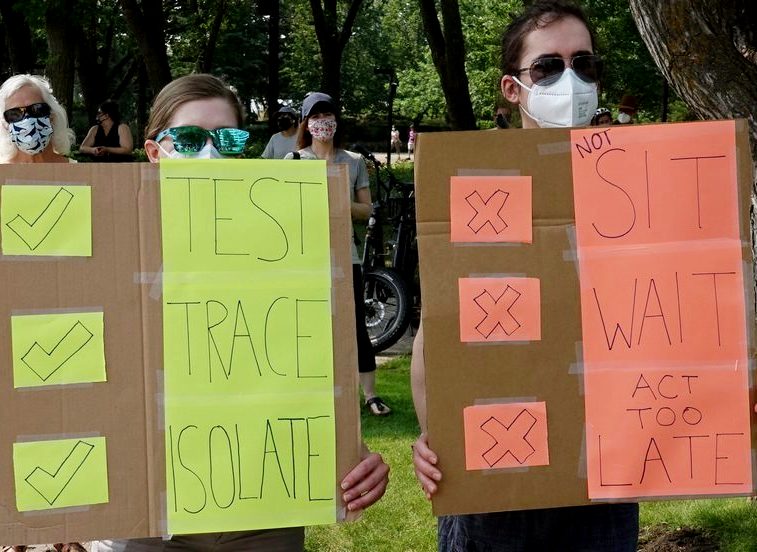 Kenney
himself, in response to calls from every quarter for a circuit-breaker
lockdown as was implemented at the start of the pandemic, made the
outrageous comment that he would not do so because that would "punish"
people who are vaccinated. While frontline workers and people
everywhere are making sacrifices, taking social
responsibility to protect themselves and others and demanding
government action to protect everyone, Kenney speaks only on behalf of
the narrow private interests that insist that the economy stay "open." Kenney
himself, in response to calls from every quarter for a circuit-breaker
lockdown as was implemented at the start of the pandemic, made the
outrageous comment that he would not do so because that would "punish"
people who are vaccinated. While frontline workers and people
everywhere are making sacrifices, taking social
responsibility to protect themselves and others and demanding
government action to protect everyone, Kenney speaks only on behalf of
the narrow private interests that insist that the economy stay "open."
When the province dropped virtually all public health measures early
in the summer there was massive opposition, with daily demonstrations
and appeals from health care workers, doctors, municipal politicians
and the public to reverse course. The consequences of the government's
refusal to act are seen in the current situation. As of October
1, Alberta had the highest rate of infections in the country -- close
to four times the national average -- and deaths from COVID-19 in
Alberta are about triple the national average. Saskatchewan is in a
similar situation.
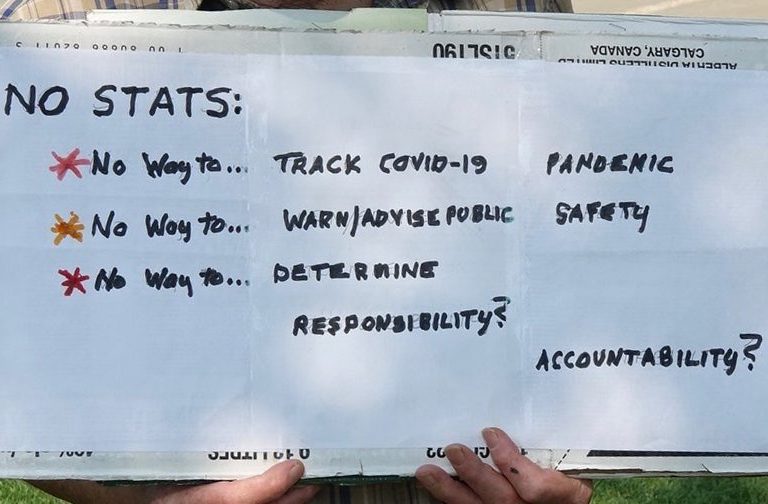 At
the base of the health care crisis is the crisis of democracy, that it
is not the people who are sovereign, who are the decision-makers. The
crisis of representative democracy is such that the people have no say
on matters that concern them and governments act on behalf of the rich
and not the people no matter the consequences. At
the base of the health care crisis is the crisis of democracy, that it
is not the people who are sovereign, who are the decision-makers. The
crisis of representative democracy is such that the people have no say
on matters that concern them and governments act on behalf of the rich
and not the people no matter the consequences.
Frontline workers and health care professionals know what needs to
be done and are continuing to fight for what is needed. Solutions to
problems can be found if everyone is informed and involved in working
out solutions. Whether the need is for human resources or for equipment
or for increased hospital capacity, the solutions depend on the
mobilization of the working class to unite all those whose common aim
is the well-being of the society itself.

- Peggy Morton -

Health
care workers demonstrate outside Royal Alexandra Hospital in Edmonton,
October 26, 2020 to defend their rights.
The
Kenney government in Alberta has announced it will add hospitals and
health care facilities to the "critical infrastructure" designated by
its anti-worker, anti-social nation-wrecking Bill 1, The Critical Infrastructure Defence Act. This
is done at a time health care workers have warned that they will not be
able to prevent the collapse of the health care system which has
endured almost three decades of neo-liberal assault. They are further saying that the
government must immediately implement the measures which health care
workers are calling for. The government is not just turning a deaf ear
to the workers but expanding its arbitrary powers to attack their
right to negotiate their own wages and working conditions, and the right of the
people to have a sustainable health care system.
 Bill
1 was introduced in February 2020 as a direct attack on Indigenous
people standing as one with the Wet'suwet'en. In introducing Bill 1,
Kenney made it crystal clear that the legislation was specifically in
response to that month’s countrywide actions in support of the
Wet'suwet'en Land Defenders' fight against the energy monopoly Coastal
GasLink's pipeline that will cross their traditional territory in
northern BC, without their consent. Bill
1 was introduced in February 2020 as a direct attack on Indigenous
people standing as one with the Wet'suwet'en. In introducing Bill 1,
Kenney made it crystal clear that the legislation was specifically in
response to that month’s countrywide actions in support of the
Wet'suwet'en Land Defenders' fight against the energy monopoly Coastal
GasLink's pipeline that will cross their traditional territory in
northern BC, without their consent.
Bill 1 makes it an offence to "without lawful right, justification
or excuse, wilfully obstruct, interrupt or interfere with the
construction, maintenance, use or operation of any essential
infrastructure in a manner that renders the essential infrastructure
dangerous, useless, inoperative or ineffective."
Now, using as a pretext the "anti-vax" rallies which took place
outside hospitals, hospitals and health care facilities will be
added through regulations to the long list of "critical infrastructure"
which the bill "protects." Under this law police can make arrests
without obtaining a warrant or injunction. It also
makes it an offence to aid, counsel, or direct another person to commit
an offence under the Act, irrespective of whether the other person
actually commits the offence.
Bill 1 has already evoked a storm of criticism from the Indigenous
peoples, workers and their organizations, human rights organizations,
legal experts and many others, and the government's claim that it is
"upholding law and order" has been met with the contempt it deserves.
This announcement will only intensify the resistance.
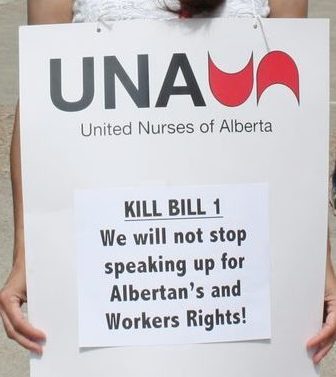 The
claim that this legislation is aimed at "anti-vaxxers" cannot be taken
seriously, any more than the claim that the aim is to protect health
care. United Nurses of Alberta (UNA) president Heather Smith expressed
concern about the timing of Alberta's change. The government could be
trying to impede future job action, she told the Edmonton Journal referring to the fact that protests at the hospitals are not taking place at this time. The
claim that this legislation is aimed at "anti-vaxxers" cannot be taken
seriously, any more than the claim that the aim is to protect health
care. United Nurses of Alberta (UNA) president Heather Smith expressed
concern about the timing of Alberta's change. The government could be
trying to impede future job action, she told the Edmonton Journal referring to the fact that protests at the hospitals are not taking place at this time.
"Certainly, I am concerned that that is the intent because, as I
said, the timing of it seems very suspicious and disconnected to actual
activities of concern," she said. UNA is currently in mediation, and
the government continues to demand that nurses accept wage rollbacks and
attacks on their working conditions which would only make the crisis
in hiring and retaining nurses more acute.
Charter challenges to Bill 1 are already in motion. It will also
certainly be challenged by the people in action to defend their human
rights as well as their civil rights. When laws do not recognize the
rights which belong to people by virtue of their being, including the
sovereign rights of Indigenous peoples and the rights of workers as the
producers of all social value, a serious problem arises. In this
regard, Bill 1 and its expansion to health care may be legal but it
also deepens the conflict between the authority and the conditions. The
fact that the authority does not conform to what the conditions require
is a big problem facing the people and society. It needs to be
addressed and resolved. It is not a problem which can be sorted out by
using force and violence in the name of "law and order."
Whether or not Bill 1 is found to be unconstitutional, which is
quite possible, it is certainly in contempt of a modern understanding
of the purpose of law to serve the cause of justice. When the law is
not seen to be just, and when it is imposed through arbitrary powers in
an attempt to threaten, intimidate, bully, and criminalize those who
are defending their rights and the rights of all to get them to
submit, it must be replaced with a rule of law worthy of the name. If
Kenney and his ilk try to use Bill 1 to attack nurses and other health
care workers who have gone so far above and beyond at the cost of their
own well-being trying to keep the health care system functioning, the
government will reap the whirlwind!
Our Security Lies in the Fight for the Rights of All! 
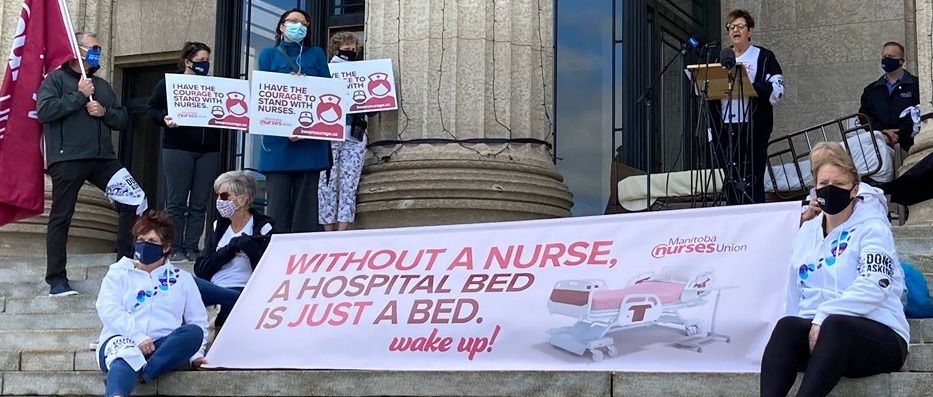
Action at Manitoba legislature on Canadian nurses day of action, September 17, 2021. (MNU)
For many years the Manitoba government has been making cuts to the
health care system while reorganizing to open up the system to
increased privatization. Nurses report short-staffing so serious that
many beds and hospital units are closed because of the shortage of
nurses to staff them. The shortages were already significant before
the pandemic and now have reached a critical level.
The Manitoba Nurses Union (MNU) which represents more than 12,000
nurses in the province reported on September 17, the nationwide Nurses
Day of Action, that there were more than 2,200 vacant positions in the
province at that time, about 1,500 of those in Winnipeg, and that
earlier in September seven nurses left Winnipeg's St. Boniface
Hospital in a nine-day period. The President of the MNU, Darlene
Jackson, said that she herself was planning to retire, "even though I
would have stayed in the profession another five years if I was working
in a reasonable situation where I wasn't mandated to work 16 hours
every shift I go to work."
While nurses are working short-staffed and forced to work excessive
overtime, hospitals are increasingly bringing in nurses from private
agencies. Information provided to the MNU by Shared Health and the
Winnipeg Regional Health Authority reveals that the number of hours
worked by agency nurses doubled in the last four years, from 181,378
province-wide in the 2017-18 fiscal year to 368,775 in the 2020-21
fiscal year. In Winnipeg alone the number of hours worked by agency
nurses increased from 9,493 in 2018-19 to 66,359 in 2019-20, an
almost seven-fold increase. Agency nurses are paid more, have more
flexibility in work assignments and are not forced to work
overtime.
The use of agency nurses ostensibly alleviates the nursing shortage
but once making money is the motive of every arrangement brought into
being everyone suffers the consequences. At present, in most
cases agency nurses are assigned to medical and surgical floors and not
to high-intensity areas like Emergency Departments and Intensive Care
Units. Often that means that hospital nurses assigned to medical and
surgical floors are reassigned to those high-intensity units for which
they are not properly trained, and their places taken by agency nurses.
Then hours and working conditions become even more untenable and this
is designed to push even more nurses into the private system. Soon, all
those nurses also will be pushed to the limit and have no defence
whatsoever. The time to oppose this is now.
Nurses oppose the diversion of public funds to private agencies and
are demanding increased investment to recruit and retain nurses and for
improved working conditions including the elimination of mandatory
overtime and arbitrary shift reassignments that make working conditions
intolerable and are driving nurses to quit.


September 10, 2021 rally opposes Ontario Hospital Association demands for concessions.
Contract negotiations between the Ontario Hospital Association (OHA)
and the representatives of 70,000 hospital workers represented by the
Ontario Council of Hospital Unions (OCHU) and the Service Employees
International Union (SEIU) have broken down. The unions announced in a
press release dated September 29 that the OHA has
refused to seriously address the pressing health and safety needs of
workers.
The press release states that "While dealing with exhaustion and the
mental and physical scars of four waves of pandemic work, Ontario
hospital workers faced an aggressive attack on their working conditions
and wages by their hospital employers, who pushed rollbacks in this
round of provincial contract negotiations, which began in June and
continued through September." Among the demands of the workers that the
OHA has rejected are guaranteed access to pandemic safety equipment, and
improved violence and mental health supports.
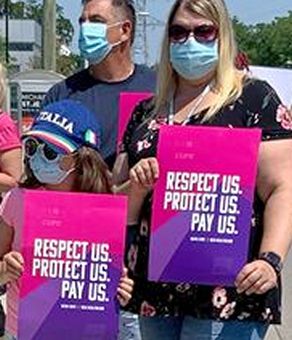 The
unions report that racially-directed abuse, sexual assault and
harassment, and physical violence and aggression against hospital
workers is a significant and growing problem. They cited a recent poll
of 2,658 frontline hospital workers in which 66 per cent said that
violent incidents have increased during the pandemic. The
unions report that racially-directed abuse, sexual assault and
harassment, and physical violence and aggression against hospital
workers is a significant and growing problem. They cited a recent poll
of 2,658 frontline hospital workers in which 66 per cent said that
violent incidents have increased during the pandemic.
The other safety issue on which the workers are holding firm is on
pandemic protection. Michael Hurley, President of OCHU says in the
press release: "The hospitals have refused throughout the pandemic to
treat COVID-19 as an airborne virus and to protect against that threat,
which has had a terrible impact on patient and worker safety.
Protecting staff from contracting or spreading the virus by providing
them with effective equipment is fundamental to protecting them, their
families, and the patients they care for. At least 860 Ontario patients
have died from the virus contracted in hospital."
Sharleen Stewart, president of SEIU Healthcare said that "Abhorrent
working conditions in Ontario's hospitals mean that surgical backlogs
will continue, and patient care will be put at risk. The provincial
government and the Ontario Hospital Association are driving our
hospital system further into the ditch and our unions simply cannot
abide
by their claw back of support at the bargaining table."
Health care workers are also faced with the Ford government's
legislation, Bill 124, which decrees a cap on compensation increases of
one per cent per year for three years. Throughout the summer the unions
organized actions at hospitals throughout the province in support of
their campaign for wages and working conditions that are acceptable
to workers, under the theme "Respect Us. Protect Us. Pay Us." These
actions were organized to inform Ontarians of the conditions of
hospital workers and mobilize public opinion for their fight in defence
of their rights and the rights of all. With the breakdown of
negotiations the unions say they will be doubling their efforts to
speak directly to
Ontarians.

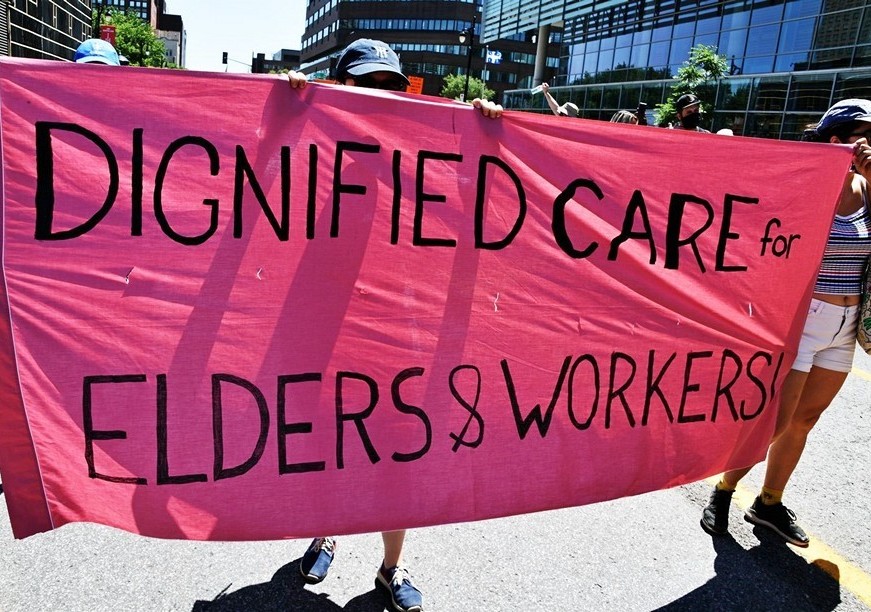 Seniors living in New Brunswick nursing homes are being denied basic
care because of the significant shortage of staff. For example, the
president of the Canadian Union of Public Employees Local 5108,
representing more than 225 workers at the Résidences Jodin home
in Edmunston, reports that residents are not getting the 2.89 hours of
direct daily care required under provincial government standards. "We
are running so short that the average direct care hours per resident is
closer to 1.8 hours per day. This is unacceptable and shameful," she
said. Another worker reported that on the weekend of September 11-12
there were only two workers for every 30 residents when the bare
minimum required is five.
Seniors living in New Brunswick nursing homes are being denied basic
care because of the significant shortage of staff. For example, the
president of the Canadian Union of Public Employees Local 5108,
representing more than 225 workers at the Résidences Jodin home
in Edmunston, reports that residents are not getting the 2.89 hours of
direct daily care required under provincial government standards. "We
are running so short that the average direct care hours per resident is
closer to 1.8 hours per day. This is unacceptable and shameful," she
said. Another worker reported that on the weekend of September 11-12
there were only two workers for every 30 residents when the bare
minimum required is five.
The union reports that inspectors from the Department of Social
Development, whose job it is to monitor the amount of time seniors are
being cared for, are not getting an accurate picture of the situation.
The inspector assigned to Résidences Jodin does not make
surprise visits and each time he visits management brings in more
staff. The
workers ask, "Why doesn't the inspector compile the schedules of the
employees over the last few months to show the minister what is really
happening here?"
The New Brunswick Council of Nursing Home Unions (NBCNHU), which
represents more than 4,600 nursing home workers, held an online press
conference on September 27 to demand immediate action from the province
to address the under-staffing crisis by implementing a $4.00 an hour
pay increase for all workers in long-term care
homes. Union leaders pointed out that the average wage for CUPE nursing
home workers in New Brunswick is $21.00 per hour which is one of the
lowest in the country. They cited the action taken in BC and Ontario
and other jurisdictions to raise the wage rate for long-term care home
workers early in the pandemic as part of measures to ensure
that workers did not have to work multiple jobs in different homes to
make a living, something that has not been done in New Brunswick.
 At
the press conference union representatives said that the situation
brought to public attention by the workers at Résidences Jodin
was also happening in Bathurst, Saint John, Woodstock and many other
places. Sharon Teare, President of the NBCNHU explained, "Seniors
are going without baths for whole weeks, they stay in bed all day
and are even dying alone, because of serious short staffing. It's
getting worse as months go by." It should be noted that the 2.89 hours
that the province requires is also low, with most advocates calling for
a minimum of 4 hours of direct care per day. At
the press conference union representatives said that the situation
brought to public attention by the workers at Résidences Jodin
was also happening in Bathurst, Saint John, Woodstock and many other
places. Sharon Teare, President of the NBCNHU explained, "Seniors
are going without baths for whole weeks, they stay in bed all day
and are even dying alone, because of serious short staffing. It's
getting worse as months go by." It should be noted that the 2.89 hours
that the province requires is also low, with most advocates calling for
a minimum of 4 hours of direct care per day.
The staff shortage in nursing homes has worsened over the course of
the pandemic and workers are facing an impossible situation. While they
continue to go above and beyond in their efforts to provide the care
that seniors need they are unable to do so and the consequences to the
health and safety of seniors and workers alike are devastating.
The demand of the workers for immediate government action to address
the problem of short-staffing deserves the support of everyone.

(To access articles individually click on the black headline.)
PDF
PREVIOUS
ISSUES | HOME
Website: www.cpcml.ca
Email: office@cpcml.ca
|

